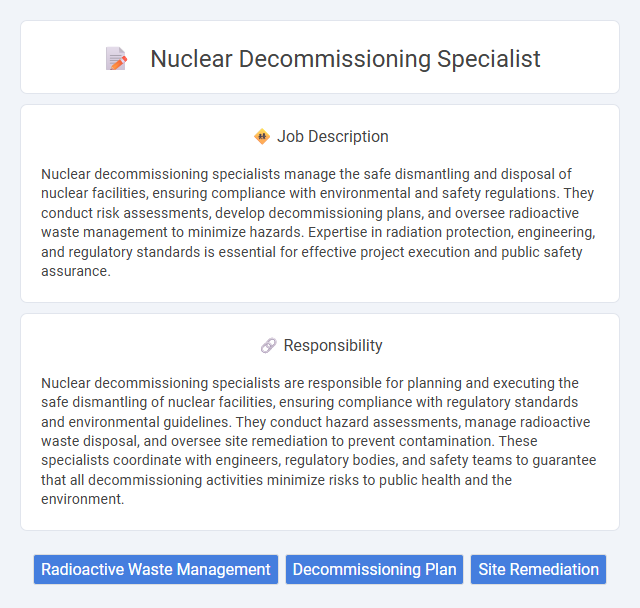
Nuclear decommissioning specialists manage the safe dismantling and disposal of nuclear facilities, ensuring compliance with environmental and safety regulations. They conduct risk assessments, develop decommissioning plans, and oversee radioactive waste management to minimize hazards. Expertise in radiation protection, engineering, and regulatory standards is essential for effective project execution and public safety assurance.
Individuals with strong analytical skills and a high tolerance for working in high-risk environments are likely suitable for a nuclear decommissioning specialist role. It is probable that those who have experience in radiation safety, engineering, or environmental science may adapt well to the demanding conditions of this job. People prone to anxiety or discomfort in hazardous settings might find this career less suitable due to the inherent stress and rigorous safety protocols involved.
Qualification
A Nuclear Decommissioning Specialist typically holds a degree in nuclear engineering, environmental science, or a related technical field, coupled with certifications in radiation safety and hazardous waste management. Extensive knowledge of regulatory frameworks such as NRC (Nuclear Regulatory Commission) guidelines and experience in project management is essential. Proficiency in risk assessment, contamination control, and radiological monitoring further qualifies candidates to safely dismantle and manage nuclear facilities.
Responsibility
Nuclear decommissioning specialists are responsible for planning and executing the safe dismantling of nuclear facilities, ensuring compliance with regulatory standards and environmental guidelines. They conduct hazard assessments, manage radioactive waste disposal, and oversee site remediation to prevent contamination. These specialists coordinate with engineers, regulatory bodies, and safety teams to guarantee that all decommissioning activities minimize risks to public health and the environment.
Benefit
Nuclear decommissioning specialists likely enjoy high job stability due to the ongoing need to safely dismantle aging nuclear facilities. They probably receive competitive salaries and comprehensive benefits given the expertise and risk involved in their work. Opportunities for career growth and continuous skill development may also be common as new technologies and regulations evolve in the nuclear sector.
Challenge
Nuclear decommissioning specialists likely face complex challenges related to safely dismantling aging nuclear facilities while minimizing environmental impact. They probably navigate strict regulatory requirements and manage hazardous materials, requiring precise risk assessment and mitigation strategies. The role may demand continuous adaptation to evolving technologies and safety protocols to ensure secure site restoration.
Career Advancement
Nuclear decommissioning specialists play a critical role in safely dismantling and managing radioactive materials from retired nuclear facilities, ensuring regulatory compliance and environmental protection. Career advancement opportunities often lead to senior project management roles, regulatory advisory positions, or consultancy within government agencies and private sector firms specializing in nuclear waste management. Gaining expertise in radiation safety, environmental engineering, and project coordination significantly boosts prospects for leadership roles and specialized technical positions within the nuclear industry.
Key Terms
Radioactive Waste Management
A Nuclear decommissioning specialist in Radioactive Waste Management oversees the safe handling, transportation, and disposal of radioactive materials from decommissioned nuclear facilities. Their responsibilities include developing waste containment strategies, ensuring compliance with regulatory standards such as the Nuclear Regulatory Commission (NRC) guidelines, and optimizing radiation protection measures to minimize environmental impact. Proficiency in radiological assessment, waste characterization, and project management is essential to effectively mitigate risks associated with nuclear waste.
Decommissioning Plan
A Nuclear decommissioning specialist develops and implements detailed decommissioning plans that ensure safe, compliant dismantling of nuclear facilities. These plans address radiation protection, waste management, and site restoration based on regulatory frameworks like NRC and IAEA guidelines. Expertise in risk assessment, project management, and environmental impact analysis is essential for optimizing decommissioning schedules and minimizing costs.
Site Remediation
Nuclear decommissioning specialists focus on site remediation by safely dismantling nuclear facilities and managing radioactive waste to restore contaminated sites to acceptable environmental standards. They apply advanced techniques for soil decontamination, groundwater purification, and structural demolition while ensuring strict regulatory compliance and radiation protection. Expertise in environmental monitoring, risk assessment, and project management is crucial for mitigating long-term environmental impacts and supporting sustainable site reuse.
 kuljobs.com
kuljobs.com